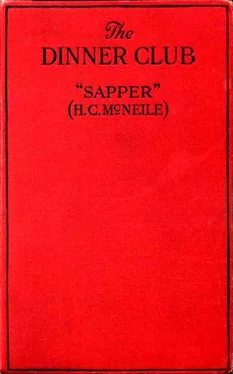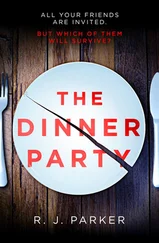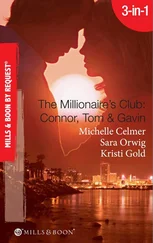He held out his hand, and the Soldier leaning forward saw that it contained a little bundle of five-pound notes.
CHAPTER II – The Barrister’s Story, being The Decision of Sir Edward Shoreham
“This morning,” he began, leaning back in his chair and crossing his legs, “I mislaid my cigarette-case. I knew it was somewhere in the study, but find it I could not. Finally, having searched all over my writing table, I rang the bell, and somewhat irritably demanded its immediate production. The butler stepped forward and lifted it up from the centre of the blotting pad, where it had been the whole time, literally under my nose. What peculiar temporary kink in the brain had prevented my noticing the very thing I was looking for, when it was lying in the most conspicuous place in which it could possibly have been, I don’t know. I leave that to the Doctor. But the point of my parable is this—it decided in my mind the story with which I should bore you fellows to-night.”
He paused to light a cigar, then he glanced round at the faces of the other five.
“And if, as I get on with it, you think you recognise the real characters under the fictional names I shall give them, I can’t prevent you. But don’t ask me to confirm your thoughts.”
“Exactly,” murmured the Actor. “Fire ahead.”
“It was about four years before the war,” commenced the Barrister, “that I was stopping for a few nights at a certain house in Park Lane. It was in the middle of the season—June, to be accurate—and I was waiting to get in here. My wife was in the country, and, as I was more or less at a loose end, I accepted the offer of staying at this house. My hostess—shall we call her Granger, Ruth Granger—had been an old school pal of my wife’s; in later years she had become a real, intimate friend of us both.
“At the time of which I speak she was a lovely girl of twenty-six, with the suffering of six years of hell in her eyes. At the age of twenty she had married Sir Henry Granger, and that fatal mistake had been the cause of the hell. Henry Granger was one of the most loathsome brutes it has ever been my misfortune to run across. He had not one single instinct of a gentleman in him, though he did happen to be the tenth baronet. How her parents had ever allowed the marriage beat me completely. Perhaps it was money, for Granger was rich; but whatever it was she married him, and her hell began.
“Granger was simply an animal, a coarse and vicious animal. He drank heavily without getting drunk, which is always a dangerous sign, and he possessed the morals—or did not possess the morals, whichever you prefer—of a monkey. He was unfaithful to her on their honeymoon—my wife told me that; and from then on he made not the slightest attempt to conceal his mode of life.”
The Barrister carefully removed the ash from his cigar. “I won’t labour the point,” he went on with a faint smile. “We have all of us met the type, but I’d like to emphasise the fact that I, at any rate, have never met any member of that type who came within a mile of him. Most of ’em have some semblance of decency about ’em—make some attempt to conceal their affairs. Granger didn’t; he seemed to prefer that they should be known. Sometimes since then I have wondered whether he was actuated by a sort of blind rage—by a mad desire to pierce through the calm, icy contempt of his wife; to make her writhe and suffer, because he realised she was so immeasurably his superior.” He paused thoughtfully. “He made her suffer right enough.”
“Did she never try for a divorce?” asked the Soldier.
“No, never. We discussed it once—she, and my wife and I; and I had to explain to her our peculiar laws on the subject. His adultery by itself was, of course, not sufficient, and for some reason she flatly refused to consider a mere separation. She wouldn’t face the scandal and publicity for only that. I said to her then: ‘Why not apply for a restitution of conjugal rights. Get your husband to leave the house, and if he doesn’t return in fourteen days——’
“She stopped me with a bitter laugh.
“ ‘It seems rather fatuous,’ she said slowly, ‘getting a lawyer to ask my husband to do what he is only too ready to do—return to me.’
“ ‘But surely,’ I began, not quite taking her meaning.
“ ‘You see, Bill,’ she answered in a flat, dead voice, ‘my husband is very fond of me—as a stopgap. After most of his episodes he honours me with his attentions for two or three days.’
“That was the devil of it—he didn’t intend to let her divorce him. She formed an excellent hostess for his house, and for the rest there were always les autres. And he wanted her, too, because he couldn’t get her, and that made him mad.”
The Barrister leant forward, and the firelight flickered on his thin, ascetic face.
“Such was the state of affairs when I went to stay. The particular lady at the time who was being honoured by Henry Granger was a shining light in musical comedy—Nelly Jones, shall we call her? It is very far from her real name. If possible, he had been more open over this affair than usual; everyone who knew the Grangers in London knew about it—everyone. He had twice dined with her at the same restaurant at which his wife was entertaining, once deliberately selecting the next table.”
“What an unmitigated swine!” cried the Ordinary Man.
“He was,” agreed the Barrister briefly. “But even that was not sufficient to satisfy the gentleman. He proceeded to do a thing which put him for ever outside the pale. He brought this girl to a reception of his wife’s at his own house.
“It was the night that I arrived. She had fixed up one of those ghastly entertainments which are now, thank Heaven, practically extinct. Somebody sings and nobody listens, and you meet everybody you particularly want to avoid. Mercifully I ran into an old pal, also of your calling, Actor-man—Violet Seymour. No reason why I should disguise her name at any rate. She was not acting at the moment, and we sat in a sort of alcove-place at the top of the stairs, on the same landing as the reception-room.
“ ‘There’s going to be a break here soon, Bill,’ she said to me after a while. ‘Ruth is going to snap.’
“ ‘Poor girl!’ I answered. ‘But what the devil can one do, Violet?’
“ ‘Nothing,’ she said fiercely, ‘except alter your abominably unjust laws. Why can’t she get a divorce, Bill? It’s vile—utterly vile.’
“And then—well, let’s call him Sir Edward Shoreham, joined us. He was on the Bench—a judge, which makes the disguise of a false name pretty thin, especially in view of what is to come. I remember he had recently taken a murder case—one that had aroused a good deal of popular attention—and the prisoner had been found guilty. We were talking about it at the time Sir Edward arrived, with Violet, as usual, tilting lances against every form of authority.
“I can see her now as she turned to Sir Edward with a sort of dreadful fascination on her face.
“ ‘And so you sentenced him to death?’
“He nodded gravely. ‘Certainly,’ he answered. ‘He was guilty.’
“And then she turned half-away, speaking almost under her breath.
“ ‘And doesn’t it ever appall you? Make you wake in the middle of the night, with your mouth dry and your throat parched. All this—life, love—and in a cell, a man waiting—a man you’ve sent there. Ticking off the days on his nerveless fingers—staring out at the sun. My God! it would drive me mad.’
“Ned Shoreham smiled a little grimly.
“ ‘You seem to forget one unimportant factor,’ he answered; ‘the wretched woman that man killed.’
“ ‘No, I don’t,’ she cried. ‘But the punishment is so immeasurably worse than the crime. I don’t think death would matter if it came suddenly; but to sit waiting with a sort of sickening helplessness——’
Читать дальше












